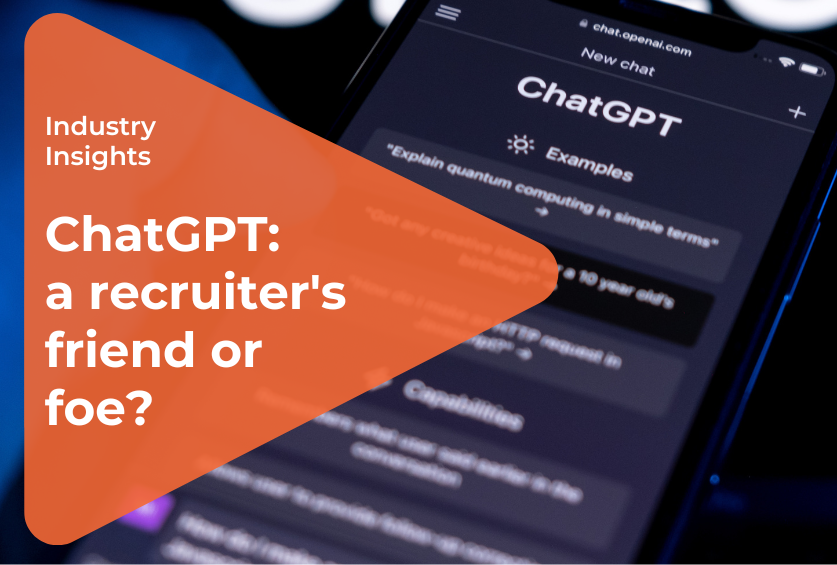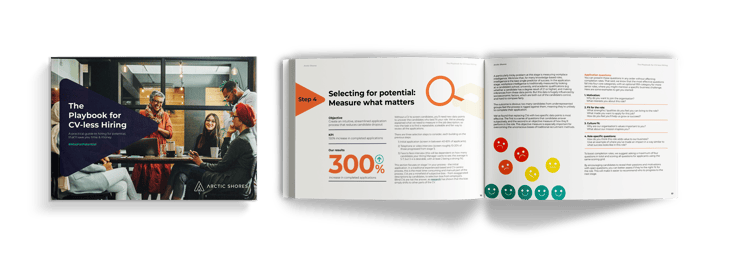
Think back to last October. You probably sensed where recruitment was headed. You felt, no doubt, that technology would keep shaping and reshaping the world of talent, just as it did over the pandemic. There would be some interesting new developments on your existing tech stack, but nothing revolutionary. After all, you can never really see the future. You can only squint at it.
Fast forward to November, when the future landed right in your lap (or, at least, your laptop). Fast forward to ChatGPT.
So much has been written about ChatGPT in recruitment since its launch, celebrating the industry's AI-enabled future. The burdensome and repetitive part of recruitment will soon be over thanks to generative AI Job descriptions and interview questions that can be created on the fly. Ideas for candidate feedback and engagement can be created in multiple ways with multiple sentiments to match different personas.
But as millions obsess over this new approach using ChatGPT in recruiting, a more challenging angle is emerging.
The demise of the traditional hiring toolkit
Let’s be clear – AI won’t replace recruiters. Other recruiters will - the ones who have worked out how to harness its capabilities (or use tools that will).
The future’s successful recruiters will know one thing: bots like ChatGPT and Bard will make writing job descriptions, interview questions, adverts, and personalised candidate outreach a quick and easy task - done on the fly and with some necessary and valuable human modification. It won’t just add to their old toolkit – it destroys that toolkit.
This is also true for the candidate though. When AI can write the perfect cover letter in seconds, amend any CV to look impressive, pass the hardest technical tasks, and go full Kerouac on an application form, how will recruiters be able to distinguish between applicants? As one Reddit user observed in a ChatGPT discussion thread, if recruiters use AI to screen applications, and then use AI to write the application - it's guaranteed to like the AI input! ChatGPT signifies the end of an era for the cover letter and the CV. The key question recruiters should be asking themselves is: “If ChatGPT makes the cover letter and the CV meaningless, what do we replace that well-established screening tool with?”
With ChatGPT and recruitment becoming the hottest topic out there, it’s time to reassess how we assess. New times call for new measures.
Scrap the CV and ditch the cover letter
Before ChatGPT, only one-third of senior people leaders felt CVs were effective. But generative AI is the final nail in the coffin. If every candidate has access to an AI tool to make the perfect cover letter or application form, what is the point of any text based application?
Imagine you’re a candidate desperate for a job. Which option would you take?
Option 1: Write your own CV, hoping it hits all the right notes
Option 2: Feed ChatGPT all the cues from the job ad, for a pitch-perfect CV
Many candidates are already choosing that second door. And while it levels the playing field in the very short term, when everyone uses it to enhance their CV, there will be no way to distinguish between any of them.
If savvy candidates can ‘game’ your process, isn't it time to reassess it before it falls apart? At best, the CV tells you where someone has worked but we know that doesn’t count for anything. At worst, it hides fraudulent applications. Oh, and now that ChatGPT can write a word-perfect cover letter in the style of your favourite author, that option is out too.
You will soon be inundated with messages highlighting new solutions to screen applicants and avoid the impending CV crisis triggered by the newest ways to combine ChatGPT and recruiting.
There are five criteria to consider before you jump in with a new piece of HR Tech:
- It can’t be text based. That is what ChatGPT is so good at
- It can’t involve you spending more time screening candidates than before (a video interview takes on average 2-3 minutes at best to review properly, for example)
- It has to give the candidate the chance to show their full potential just as much as the previous process (so it has to be more than a cognitive test)
- It can’t confer any advantage to any group
- It can’t narrow the talent pool (the skills crisis isn’t going away!)
Psychometric Assessments: the pathway to potential?
Once you scrap the CV and move away from text based applications, you need an alternative to discover and measure the candidate’s soft skills (and in certain cases hard skills). Using a psychometrics test can enable this but not the questionnaire-based ones you might’ve come across in the past. In the 21st Century, there are new, innovative approaches which capture a candidate’s innate soft skills (which we like to call human skills because ‘soft’ demeans them), like creativity and resilience, as well as their cognitive ability (which we like to call workplace intelligence).
Psychometric assessments on their own aren’t a silver bullet though. They are a tool to support better human decision-making, so how you use them and the way you use them is critical to the value they will provide. It starts with making sure you really understand what drives success in the role. A good assessment tool and a good provider of such a tool will have a reliable, repeatable and where the necessary evidence-based process for doing this. Short-cutting or skipping this step is counter-productive and potentially disastrous.
The other point about a psychometric assessment is that you want data from the assessment on areas you can’t easily assess through an interview (whether video based or face to face). Things like: What is their resilience like? How will they perform under pressure? Are they empathetic? More and more companies are recruiting for values but asking someone about how they might behave or what motivates them is very different from observing or capturing how they react when doing something.
What about new roles or technical roles? Many organisations have realised that chasing a limited talent pool, paying ever higher salaries to attract passive candidates, with a long time to hire is not a commercial way forward.
ChatGPT in recruitment means it's time to drop the old hiring manual
One of our clients, a large European engineering firm, had a role open for 200 days and had 12 applications. The view of the TA team was that it was a specialised role and it would take time to find the right person from a very limited pool. Given the productivity impact, the Managing Director decided a new approach was needed and the company would provide the training to get the person up to speed.
He agreed to tear up the old hiring approach and focus entirely on potential. The organisation would promote that no CV was required and that the firm was open to anyone who had the right behaviours. They received over 500 applications from which they screen in the top 60 and brought 8 to final interview - without looking at a CV at any point. To their surprise and delight the quality of the final 8 was so good that they could have hired all 8 of them! One of the 8 was an internal candidate, who would never have thought of applying but the job advert said no previous experience in the role was needed. For the whole hiring team, it was like an epiphany - their eyes had been opened to a wonderful expanded talent pool that they had no idea existed until they had taken this approach.
There is a different way and the cost of hire, the time to hire and the quality of hire will be better, not worse.
With ChatGPT, hiring for potential becomes non-negotiable
ChatGPT will undermine the old hiring toolkit, spelling the end for the CV. Now, recruiters must adapt.
But thinking differently is only the first step in overcoming the new ways people are using ChatGPT for recruiting. Just because you’re ready to hire for potential, doesn’t mean everyone else in your organisation is. How do you convince your hiring managers? Your people leaders? Even your CEO? And then, crucially, how do you make it work? To answer these questions, we’ve written the first Hiring for Potential Playbook: a step-by-step guide to getting it right.
Download your copy here, escape the experience trap, and start seeing more in people today.
Read Next
Sign up for our newsletter to be notified as soon as our next research piece drops.
Join over 2,000 disruptive TA leaders and get insights into the latest trends turning TA on its head in your inbox, every week
Sign up for our newsletter to be notified as soon as our next research piece drops.
Join over 2,000 disruptive TA leaders and get insights into the latest trends turning TA on its head in your inbox, every week



